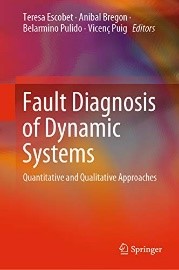Programme
Automated diagnosis of devices and systems is a very interesting and active research and development field. It can be approached with different techniques (i.e. knowledge-based systems, case-based reasoning, data-driven methods including machine-learning or model-based reasoning) coming from different fields: Control Engineering, Artificial Intelligence or Statistics . This intensive course will tackle these different perspectives including both theory lectures and practical exercises focused on application problems.
This School is conceived as an intensive seminar which will take place during a week (4-8 of July) in Girona (Catalunya, Spain) at the Campus Montilivi of the Universitat de Girona (UdG). The main goal is to introduce students to different diagnosis approaches providing the vision of experts in the field coming from different research communities including Control Engineering, Artificial Intelligence and Statistics. The topics covered in this edition will be:
- Fundamental concepts
- Model-based fault detection and diagnosis (FDI): the control engineering approach
- Data-driven methods: Fault diagnosis based on multivariate statistical methods
- Model-based diagnosis (DX): the artificial intelligence approach
- Introduction to prognostics, and prognostics for electronic devices
- The BRIGDE framework
Time | Monday | Tuesday | Wednesday | Thursday | Friday |
09:00-10:00 | 9:00-9:30 Registration | T2.4 FDI Approach: fault Isolation: Structural and directional residuals | T4.1 AI-DX (Model based) pproach: CBD, Consistency-based diagnosis. T4.2 AI-DX (Model based) Approach: GDE. The computational approach to CBD | T6. Software diagnosis | T8- Prognosis |
10:00-11:00 | T1.1 Fundamentals: Concepts and definitions (J. Armengol) | ||||
11:00-11:30 | Coffee Break | Coffee Break | Coffee Break | Coffee Break | Coffee Break |
11:30-12:30 | T1.2 Fundamentals: Foundations for FD &D in FDI and DX (V.Puig) | T3.1 Data driven FDI: Statistical methods I | T4.2 AI-DX (Model based) Approach: GDE. The computational approach to CBD | T7. Discrete event systems | T9. BRIDGE |
12:30-13:30 | T2.1 FDI Approach: Structural Analysis and analytical redundancy (V. Puig) | ||||
13:30-15:00 | Lunch | Lunch | Lunch | Lunch | Lunch |
15:00-16:30 | T2.2 FDI Approach: Detection methods | T3.1 Data driven FDI: Statistical methods II | T4.3 AI-DX (Model based) Approach: Alternatives to GDE. Multiple faults | T7. Discrete event systems | |
16:30-17:00 | Coffee Break | Coffee Break | Coffee Break | Coffee Break | |
17:00-18:00 | T2.3.2 FDI Approach: Envelop generation | T3.2 Data Driven methods: Deep Learning-based Application for Fault Location in Active Distribution Grids | T5. Diagnosing Business Processes | T7. Discrete event systems | |
Tentative programme:
T1. INTRODUCTION. FUNDAMENTAL CONCEPTS
T1.1 Definitions: fault, failure, detection, diagnosis, reliability…
T1.2 Foundations for fault detection and diagnosis in FDI and DX: detectability, observability, diagnosability…
T2. THE FDI APPROACH
T2.1. Structural analysis and analytical redundancy.
T2.2. Model-based detection methods: parameter estimation, parity equations, state observers for linear and non-linear models.
T2.3. Fault detection: residual evaluation by consistency tests, and envelope generators.
T2.4. Fault isolation: structured and directional residuals.
T3. STATISTICAL APPROACHES TO FAULT DIAGNOSIS
T3.1 Data driven methods
T3.2 Fault diagnosis using statistical methods
T3.3 Applications
T4. THE DX APPROACH
T4.1 Model-based diagnosis from AI Community. Consistency-based diagnosis, CBD: Theoretical (Reiter’s ) approach.
T4.2 GDE: the computational approach to CBD.
T4.3 Computational alternatives to GDE. Diagnosing multiple faults.
T4.4 Constraint-driven fault diagnosis.
T5. DIAGNOSIS BUSINESS PROCESSES
T5.1 Introduction to Business Processes
T5.2 Diagnosis in the Business Process lifecycle
T5.3 Self-adapttive Business Processes
T5.4 Challenges and applications
T6. SOFTWARE DIAGNOSIS
T6.1 Introduction
T6.2 Software Testing
T6.3 Software Debugging
T6.4 Software Configuration Diagnosis
T7. DISCRETE EVENTS SYSTEMS DIAGNOSIS
T8. PROGNOSIS
T8.1 Introduction to prognosis
T8.2 Understanding the prognosis problem
T8.3 Prognosis methods
T8.4 Challenges and applications
T9. DISCRETE EVENTS SYSTEMS DIAGNOSIS
T9.1 Theoretical links and comparison.
T9.2 Practical comparison and potential synergies
Reference book: contributed by lecturers of this school

Fault Diagnosis of Dynamic Systems: Quantitative and Qualitative Approaches, Springer, 2019
